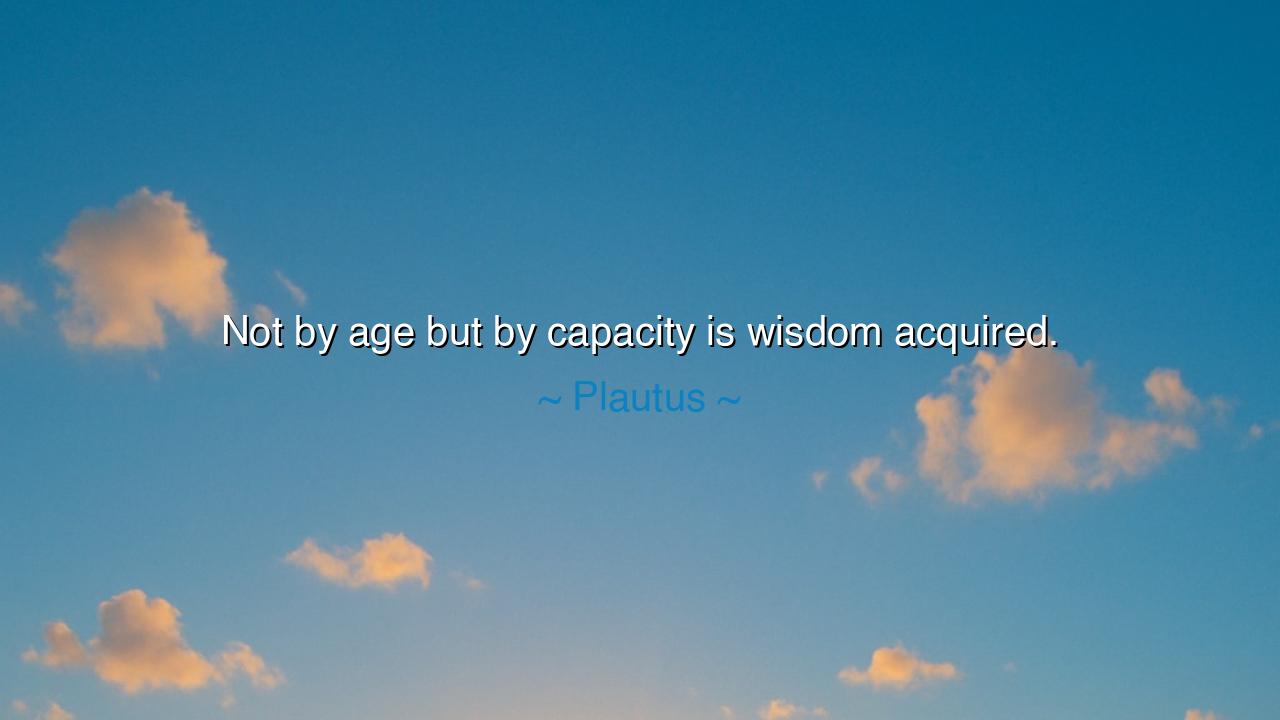
Not by age but by capacity is wisdom acquired.






In the passage of time, the world has often told us that wisdom is the fruit of age—that with each year, we become more knowledgeable, more insightful. Yet, the great Roman playwright Plautus challenges this idea with the timeless truth: "Not by age but by capacity is wisdom acquired." These words shatter the belief that wisdom is simply a product of the years we accumulate. Instead, Plautus points to the inner capacity—the willingness to learn, to grow, and to embrace life’s lessons—as the true measure of wisdom. It is not the years that give us wisdom, but the depth of our experiences, the quality of our reflections, and the openness of our minds.
The ancients were no strangers to the tension between age and wisdom. The Greek philosophers, from Socrates to Plato, argued that wisdom does not come with age alone. Socrates, in his dialogues, often reminded his followers that true wisdom comes not from the accumulation of facts or the passage of time, but from the pursuit of truth and the questioning of assumptions. In fact, Socrates believed that self-awareness and the ability to question one’s own beliefs were the very foundations of wisdom. This active engagement with life—not simply passive experience—is what Plautus refers to. It is the capacity to reflect, to learn from failure, and to adapt that shapes true wisdom, not the mere accumulation of years.
Consider the life of Leonardo da Vinci, who, despite living well over 500 years ago, continues to be celebrated as one of the greatest minds in history. Leonardo lived a long life, but it was not the passage of time that made him wise. It was his relentless curiosity, his drive to question everything, and his capacity to learn that made him a genius. He mastered fields as diverse as art, engineering, and anatomy, constantly seeking to understand the world around him. For da Vinci, wisdom did not come with age—it came with perception, imagination, and the courage to see the world not as it was, but as it could be. He is a living testament to Plautus' belief that wisdom is not a natural consequence of age, but of an active, engaged mind.
In more recent history, consider the example of Mahatma Gandhi, whose wisdom was not a result of the years he lived, but of the choices he made in his life. Gandhi spent his youth in South Africa, learning the values of nonviolence and justice that would shape the world. When he returned to India, he was already an agent of change, a wise leader whose capacity for empathy and understanding far exceeded his age. His wisdom came not from his years but from his capacity to see the world through the eyes of the oppressed, to question the moral fabric of colonial rule, and to act with courage in the face of overwhelming adversity. Like Plautus, Gandhi teaches us that wisdom is not the exclusive domain of the old, but of those who engage with life deeply and with purpose.
Plautus’ insight is a powerful reminder that age should not be a measure of wisdom. The true gift of wisdom is granted not by the number of years we accumulate but by how we choose to use those years. It is a matter of capacity, not time. Youthful energy, when guided by a clear purpose and deep reflection, can possess profound wisdom, while those who are older may hold themselves captive to stale ideas, unwilling to learn or grow. Age alone does not guarantee understanding or insight—it is the depth of one’s engagement with the world, the willingness to challenge assumptions, and the ability to adapt that create true wisdom.
The lesson here is clear: wisdom is within reach of all, regardless of age, provided we cultivate the capacity to learn and the willingness to grow. We must not surrender ourselves to the idea that as we age, we must simply accept our limitations or embrace rigid beliefs. Instead, we must constantly strive to question, to reflect, and to engage with the world in an open and curious manner. Wisdom comes when we are humble enough to learn from both our successes and our failures, when we embrace change and seek to understand the complexities of life. The great minds of history did not rest on their laurels as they grew older—they remained dynamic, engaged, and adaptable, continuously refining their understanding of the world.
Thus, let us follow the wisdom of Plautus and the ancients, knowing that the true measure of wisdom is not in the years but in the capacity of our hearts and minds to grow, learn, and evolve. Age is but a number; it is the engagement with life that truly defines us. May we, too, be like the great thinkers and leaders of history, refusing to become stagnant in our thinking as we age, and instead seeking always to expand and refine our wisdom. Let us remember that wisdom is earned not by the passing of time but by the depth of our journey, the capacity with which we open ourselves to learning, and the courage with which we face the challenges of the world.






AAdministratorAdministrator
Welcome, honored guests. Please leave a comment, we will respond soon